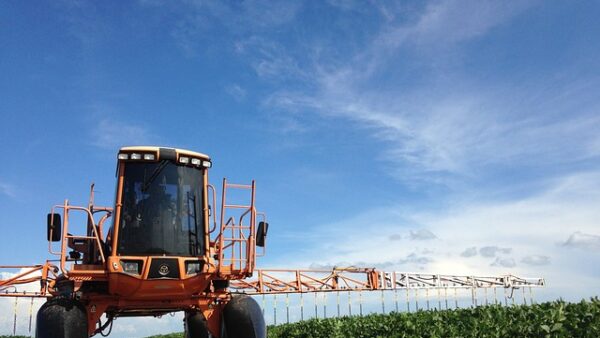More than 20 U.S. states are saying no to (some) foreign land ownership. In the case of 160 acres long-held by Syngenta, the decision could carry hidden costs to farmers.
Arkansas recently ordered Northrup King Seed Co., a subsidiary of Chinese-owned Syngenta, to sell 160 acres of farmland in Arkansas. The state went further and fined the global seed enterprise nearly $300,000 for failing to file papers about its land holdings in a timely manner. This all comes on the heels of recent legislation in Arkansas and more than 20 other states, aiming to limit foreign-owned land. According to the states that are enacting the legislation, most of the legislation is in response to national security concerns.
Syngenta argues that their Arkansas employees are Americans, working at an American-led company, who deeply care about serving Arkansas farmers.
“This action hurts Arkansas farmers more than anyone else,” said Justin Wolfe, president, Syngenta Seeds. “Syngenta is disappointed by the announcement. The order for Syngenta to divest itself of 160 acres of agricultural land in Craighead County, which the company has owned since 1988, is a shortsighted action that fails to account for the effects of such an action, intended or not, on the U.S. agricultural market.”
Marty Eaton, general manager for Arkansas’ Cache River Valley Seed LLC in Cash, Arkansas, sees the situation from both sides. He is aware that most people generally don’t want China owning land in the United States and understands that sentiment. But he says the local situation with Syngenta is not so cut and dried.
“We work with these people,” he says. “They are our friends. A lot of local people cut their teeth in the agriculture industry at this research station.”
Going back a bit to when the research station began, Northrup King was an American-owned company that began in Minnesota in 1884. In 1973, Northrup King celebrated 50 years of producing and marketing hybrid seed corn in the United States. Three years later, Swiss-based pharmaceutical company Sandoz purchased the seed company but kept the Northrup King brand. In 1996, Sandoz merged with Ciba, which resulted in a merger between Northrup King and Ciba Seeds to become Novartis Seeds, representing hybrid corn and oilseeds worldwide. A few years later, Novartis and AstraZeneca merged to create Syngenta AG. Then in 2016, ChemChina acquired Syngenta, in a move to overhaul Chinese agriculture.
While the land’s ownership may be foreign, the land’s value to farmers is much closer to home. Eaton says the 160-acre soybean research station produces results local and regional farmers rely on to make their enterprises more efficient. While 160 acres may sound like a large plot of land to the average non-agricultural person, he says the fact that the average American farm is 2,500 acres, puts the acreage into a realistic perspective. He says the Craighead County land is one little piece of land that has done a lot of good for Mid-South farmers for the past 35 years.
“In our eyes, Northrup King gives local farmers new crop varieties based on the local soils that our farmers use,” he explains. “What do we do if that goes away? Look to trials in other states, with different soil profiles? You want yield trial results and varieties that are bred and tested as close to your farming operation as you can get and this research farm is right in the heart of the Mid-South Delta region. Another part of it is jobs. All the employees there are Americans. Will they lose their jobs?”
So, what is fueling all the fear and the increasing regulations about foreign ownership? It’s not agriculture. It’s not the seed industry. It’s ultimately tensions between the United States and China. In addition to increasing political tensions between the two superpowers, there have been recent and very publicized concerns about Chinese spying and security breaches.
In 2021, a Chinese company purchased land near a North Dakota Air Force base, and there’s the recent Chinese spy balloon that traversed the country. Lawmakers and U.S. citizens alike have sounded alarms. The North Dakota land purchase raised fears that China may be trying to take little bits of control in the United States by having Chinese companies acquire U.S. assets. Lawmakers are doing a balancing act of trying to quell fear and take actions to protect the country from perceived threats. In doing so, they may be tossing the diamond out with the dirt in scenarios like the one playing out in Arkansas. According to the U.S. Department of Agriculture, the total number of U.S. agricultural acres was just fewer than 894 million acres. Chinese companies currently own less than 400,000 acres in the U.S., or less than 0.04% of total land. Other foreign countries own larger pieces of the pie. Canada owns 12.8 million acres; the Netherlands owns 4.9 million acres. Other countries such as Italy, the United Kingdom and Germany all own more than China.
As for Syngenta specifically, Wolfe says the company currently owns only 1,500 total acres in the United States.
“Syngenta’s agricultural land including the 160 acres in Craighead County, is used for research, development, regulatory trials, and production to meet the needs of American farmers and to drive competition and innovation within the U.S. agricultural market,” he says. “In fact, in many instances, Syngenta is required by law to develop and test products it sells in the U.S. domestically on U.S. soil.”
Following an internal review, Syngenta updated its Agricultural Foreign Investment Disclosure paperwork reflecting the change in its ultimate ownership and filed a copy with the State of Arkansas.
“Our site has been in existence for 35 years and our people there have faithfully served American farmers all that time,” Wolfe says. “We intend to do all we can to help enable these Americans to continue serving American farmers.”













